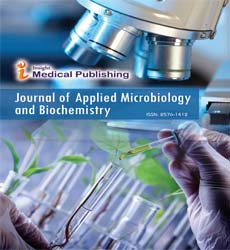ISSN : ISSN: 2576-1412
Journal of Applied Microbiology and Biochemistry
The Crucial Role of Clinical Microbiology in Modern Healthcare
Rawat Garg*
Red Sea Research Center, Thuwal, Saudi Arabia
- *Corresponding Author:
- Rawat Garg
Red Sea Research Center, Thuwal,
Saudi Arabia,
E-mail: grag@foxmail.com
Received date: January 29, 2024, Manuscript No. IPJAMB-24-18835; Editor assigned date: February 01, 2024, PreQC No. IPJAMB-24-18835 (PQ); Reviewed date: February 15, 2024, QC No. IPJAMB-24-18835; Revised date: February 22, 2024, Manuscript No. IPJAMB-24-18835 (R); Published date: February 29, 2024, DOI: 10.36648/2576-1412.8.1.208
Citation: Garg R (2024) The Crucial Role of Clinical Microbiology in Modern Healthcare. J Appl Microbiol Biochem Vol. 8 No.1:208.
Description
Clinical microbiology is a pivotal field within healthcare that focuses on the identification, diagnosis, and management of infectious diseases caused by microorganisms. From bacterial infections to viral outbreaks, clinical microbiologists play a vital role in safeguarding public health and improving patient outcomes. This article delves into the significance of clinical microbiology, its methodologies, advancements, and its critical role in combating infectious diseases. Clinical microbiology is an indispensable component of modern healthcare, playing a vital role in the diagnosis, treatment, and prevention of infectious diseases. By employing state-of-the-art laboratory techniques and leveraging technological advancements, clinical microbiologists contribute to improving patient outcomes and mitigating the spread of infectious pathogens. Continued research and innovation in this field are essential to address emerging infectious threats and safeguard public health globally.
Understanding clinical microbiology
Clinical microbiology encompasses various disciplines such as bacteriology, virology, mycology, and parasitology. It involves the isolation and characterization of pathogens from clinical specimens obtained from patients with suspected infections. These specimens include blood, urine, sputum, cerebrospinal fluid, and tissue samples. By identifying the causative agents, clinicians can initiate appropriate treatment strategies promptly. Clinical microbiologists employ a wide array of laboratory techniques to isolate and identify microorganisms. These techniques include culture-based methods, molecular diagnostics, serological assays, and microscopy. Culture-based methods involve inoculating specimens onto specialized media to encourage the growth of microorganisms. Molecular diagnostics, such as Polymerase Chain Reaction (PCR), enable rapid and accurate identification of pathogens by detecting their genetic material. Serological assays detect antibodies produced by the host in response to infection, aiding in diagnosis. Microscopy allows for the visualization of microorganisms directly in clinical specimens. Clinical microbiologists play a crucial role in diagnosing infectious diseases, guiding treatment decisions, and monitoring the effectiveness of therapies. Rapid and accurate identification of pathogens is essential for initiating targeted antimicrobial therapy, thereby reducing the risk of treatment failure and the emergence of antimicrobial resistance. Additionally, clinical microbiologists collaborate with epidemiologists to track the spread of infectious diseases and implement appropriate control measures to prevent outbreaks.
Advancements in clinical microbiology
Recent advancements in technology have revolutionized the field of clinical microbiology. Automation and robotics have streamlined laboratory workflows, improving efficiency and reducing turnaround times for test results. Next-Generation Sequencing (NGS) techniques enable comprehensive analysis of microbial genomes, facilitating the identification of virulence factors and antimicrobial resistance genes. Furthermore, pointof- care testing devices provide rapid diagnostic results at the bedside, enhancing patient care in remote or resource-limited settings. Despite technological advancements, clinical microbiology faces several challenges, including the emergence of multidrug-resistant pathogens, limited access to diagnostic testing in certain regions, and the need for continuous surveillance to detect novel infectious agents. Future directions in clinical microbiology include the development of novel antimicrobial agents, the implementation of precision medicine approaches tailored to individual patients, and the integration of artificial intelligence and machine learning algorithms for predictive modeling of infectious disease outbreaks. Clinical microbiologists play a crucial role in identifying the pathogens responsible for infectious diseases in patients. This involves analyzing clinical specimens such as blood, urine, sputum, and tissue sample using various techniques like culture, microscopy, and molecular methods PCR, sequencing to detect and identify the causative microorganisms. Microbiological testing is essential in pharmaceutical development for quality control and assurance of pharmaceutical products. Clinical microbiologists perform microbial testing of raw materials, finished products, and manufacturing facilities to ensure compliance with regulatory standards and to prevent contamination. Clinical microbiology is applied in agriculture for the diagnosis and management of plant diseases caused by microbial pathogens. Microbiologists work to develop strategies for disease control, such as the use of biocontrol agents, genetic resistance, and integrated pest management practices Microbiological testing is critical for ensuring the safety and quality of food products. Clinical microbiologists conduct microbial analysis of food samples to detect and quantify pathogens, spoilage organisms, and contaminants, thereby preventing foodborne illnesses and ensuring compliance with food safety regulations. Clinical microbiology contributes to biotechnological and industrial applications such as the production of enzymes, antibiotics, vaccines, and biofuels. Microbiologists work in biotechnology companies and industrial settings to develop microbial-based products and processes for various applications.
Open Access Journals
- Aquaculture & Veterinary Science
- Chemistry & Chemical Sciences
- Clinical Sciences
- Engineering
- General Science
- Genetics & Molecular Biology
- Health Care & Nursing
- Immunology & Microbiology
- Materials Science
- Mathematics & Physics
- Medical Sciences
- Neurology & Psychiatry
- Oncology & Cancer Science
- Pharmaceutical Sciences
